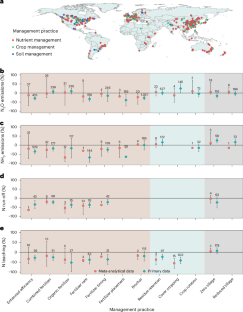Optimized agricultural management reduces global cropland nitrogen losses to air and water
IF 21.9
Q1 FOOD SCIENCE & TECHNOLOGY
引用次数: 0
Abstract
Nitrogen (N) losses from croplands substantially contribute to global N pollution. Assessing the reduction in N losses through improved N management practices is complex due to varying site conditions, such as land use, climate, soil properties and local farming methods. In this Article, we conducted a meta-analysis to evaluate the effects of improved practices on N loss reduction, analysing data from 1,065 studies with 6,753 pairs of observations comparing standard and optimized practices. Without considering site-specific conditions, optimized management practices can reduce N2O emissions by 3–39%, NH3 emissions by 15–68%, N run-off by 21–37% and N leaching by 19–52%. After considering local conditions and current practices, average reductions on a global scale were 31% for N2O, 23% for NH3, 18% for N run-off and 17% for N leaching. The effectiveness of N loss reduction was mainly influenced by optimized management practices and, to a lesser extent, site conditions. The results of this study underscore the importance of implementing optimized, site-specific management to effectively reduce N losses from global croplands. Increased agricultural nitrogen inputs lead to elevated nitrogen losses and may result in detrimental environmental impacts. This study uses meta-analyses to evaluate and predict changes in nitrogen losses to air and water in response to sustainable nutrient, crop and soil management practices.


优化农业管理减少全球耕地氮向空气和水中的流失
耕地的氮(N)流失严重加剧了全球氮污染。由于土地利用、气候、土壤特性和当地耕作方法等现场条件各不相同,因此评估通过改进氮管理方法减少氮损失的情况非常复杂。在本文中,我们进行了一项荟萃分析,以评估改进方法对减少氮损失的影响,分析了来自 1,065 项研究的数据,其中有 6,753 对观察结果,对标准方法和优化方法进行了比较。在不考虑具体地点条件的情况下,优化管理方法可减少 3-39% 的 N2O 排放、15-68% 的 NH3 排放、21-37% 的 N 径流和 19-52% 的 N 沥滤。在考虑了当地条件和当前做法后,全球范围内的平均减排量分别为:N2O 31%、NH3 23%、N 径流 18%、N 沥滤 17%。减少氮流失的效果主要受优化管理方法的影响,其次是受当地条件的影响。这项研究的结果强调了针对具体地点实施优化管理以有效减少全球耕地氮损失的重要性。
本文章由计算机程序翻译,如有差异,请以英文原文为准。
求助全文
约1分钟内获得全文
求助全文

 求助内容:
求助内容: 应助结果提醒方式:
应助结果提醒方式:


